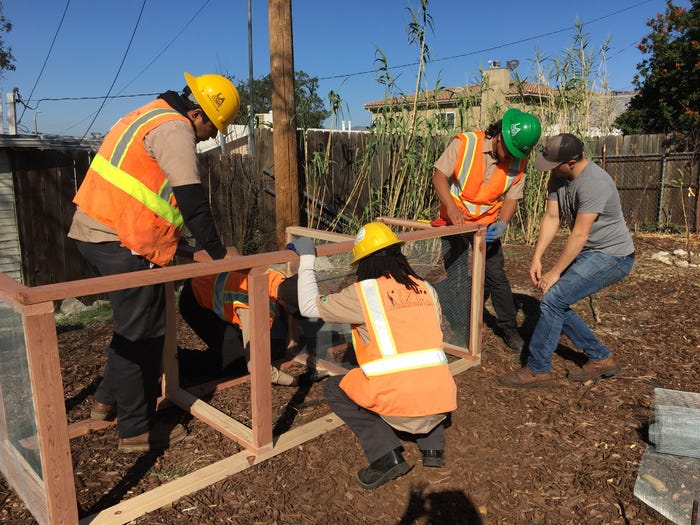L.A. Hosts First-Ever Food Waste Grant Challenge
The City of Los Angeles awarded approximately $100,000 to 10 winning projects.

The City of Los Angeles has been hard at work diverting waste from landfills and pushing toward achieving a zero waste goal of 90 percent by 2025, and in an effort to ramp up its diversion of food waste, the city recently held its first-ever Food Waste Grant Challenge.
The challenge called for local communities and organizations to submit proposals describing their ideas for how to handle food waste in their communities for a chance to receive part of the approximately $100,000 in grant funds up for grabs.
“We’ve seen a lot of interest from the public and the media involving food waste, and I think people intuitively understand that throwing away food is bad and that we waste far too much food as a community,” says Heather Repenning, a commissioner for the L.A. Department of Public Works. “There are a lot of people who don’t have access to food for several reasons, and from both an agency and human perspective, we understand that we have a lot more to do to get people to recycle more and waste less, which is what led us to create this challenge.”

The city received 27 submissions that featured a range of ideas, from community composting and drop-off sites to offering more food waste reduction education to residents, students and businesses. The city ultimately chose 10 winners—three administrative grant winners and seven project grant winners. All of the winning projects are currently underway and will be part of a future report that details a variety of metrics, revealing the projects’ measurable wins and impacts.
“Our goal is to be able to go back and apply for a bigger grant and more funding because we want to show that we can actually achieve some really important outcomes with very little investment,” states Repenning. “The grant money for this challenge came from the City of Los Angeles Board of Public Works Office of Community Beautification, but in the future, we would love to leverage outside funding to bring different types of resources into this area of work.”
The administrative grant winners include LA Compost, LA Food Policy Council and California Bioproducts Innovation Center, and the project grant winners are listed below:
Netiya
Netiya provides food donation, food waste diversion and composting education at congregations across all faiths. Netiya’s project aims to educate and mobilize the student population at de Toledo High School to institute a comprehensive program that incorporates food waste recovery and composting for an onsite food garden.
Proyecto Jardín
Proyecto Jardín has 17 years of experience facilitating the development of a vibrant intergenerational community of learners on a one-third acre urban farm in Boyle Heights. Proyecto Jardín’s project will offer its signature eight-week course, Make Compost, Not War, as a compost academy to an intergenerational cohort of 30 Eastside Los Angeles residents.
Japanese American Cultural and Community Center’s Sustainable Little Tokyo
Sustainable Little Tokyo’s Bokashi Compost Project will educate Little Tokyo residents and food businesses about food waste and its impacts, demonstrate Bokashi and organic waste composting to reduce food waste and host community gatherings at composting sites to share skills, challenges, progress updates and compost uses.
Garden School Foundation
The Garden School Foundation has more than 10 years of experience working with Los Angeles Unified School District schools in food deserts to provide daily garden-based instruction to low-income students through its Seed to Table (S2T) curriculum of 120 standards-based lessons including cooking and nutrition. Garden School Foundation’s project involves designing and implementing a month-long Cafeteria to Compost Challenge for students, teachers, faculty, parents and community stakeholders of 24th Street Elementary.
Environmental Charter Middle School (ECMS)
Environmental Charter Middle School’s mission is to create and deliver vibrant, innovative and interdisciplinary learning opportunities using the environment to engage students and connect them to the wider world. Because ECMS currently does not have a compost site, the project will create a large area on campus for the cultivation of vegetables, herbs, fruits and native plants. ECMS will work to close the food waste loop through infrastructure improvements, curriculum support and student-led community education.
LA Conservation Corps
LA Conservation Corps will work with LA Community Garden Council and LA Compost to build composting hubs at 10 community garden sites. The composting hubs will serve community gardeners and act as a collection site for kitchen scraps for local residents and business owners during specified hours each week.
LA Community Garden Council
LA Community Garden Council will create new composting hubs that will serve as educational centers, encouraging community members to avoid food waste, compost their garden and kitchen scraps, use the compost to nourish their plants and grow their own food. The program will impact 1,400 people, and the council expects to see food savings of approximately 2,000 pounds per month at each composting hub, for a total of 40,000 pounds during the 60-day challenge period.
About the Author
You May Also Like




.png?width=300&auto=webp&quality=80&disable=upscale)